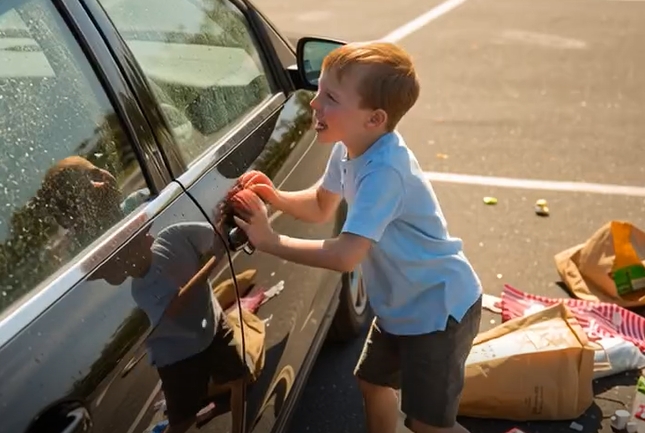It was late afternoon, the sort of golden hour when the sun dips low enough to make shadows stretch across the pavement. I had just wheeled my shopping cart across the lot, already planning to unload the groceries and hurry home. The day had been unremarkable—errands, lists, receipts crumpled in my bag. I expected nothing but routine.
Then I heard it.
A sharp, rhythmic pounding cut through the hum of traffic. At first I thought it was the squeal of a cart wheel or maybe someone slamming a trunk. But then came the unmistakable sound of sobbing. My eyes followed the noise until I saw him—a small boy, barefoot, standing on the blistering asphalt beside a black sedan.
He couldn’t have been more than five years old. His face was flushed, streaked with tears, and his little fists hammered desperately on the car door. Each strike rattled against the metal with a helpless urgency.
I stopped dead. My shopping bags slid from my hands to the ground. The scene felt wrong in every possible way. Children didn’t cry like that unless something was terribly wrong.
I hurried closer, crouching down so my face was level with his. The boy’s eyes were wide, filled with panic. He tugged on my sleeve with surprising force for someone so small, and pointed at the fogged-over window.
“Sweetheart,” I whispered, my voice softer than I felt inside. “Where’s your mom or dad?”
He only shook his head, chest heaving. His sobs had turned to hiccuping gasps, but he didn’t stop pounding on the door. He wanted me to look.
I placed my palm against the glass. It was hot to the touch, the kind of heat that builds when a car sits sealed under the sun. The window was coated in condensation, a strange mix of moisture and streaks that made it difficult to see inside. I leaned closer, searching for any hint of movement.
There was a small patch where the fog had cleared. I bent down, pressing my face to it. What I saw made my stomach plummet.
Through that gap I caught the outline of another child strapped in the back seat. The little body was motionless, head slumped forward. For a split second I thought the worst. My breath locked in my chest, and the parking lot seemed to tilt.
Fumbling, I snatched my phone from my bag. My hands shook as I punched in three numbers. “Nine-one-one,” I gasped when the operator picked up. “There’s a child locked in a car—please, hurry!”
The boy clutched at my arm as I gave the dispatcher details—the location, the make of the car, the condition of the child inside. My voice wavered, but the urgency steadied me.
“Stay with them,” the operator instructed. “Help is on the way.”
Minutes dragged like hours. I ran my hand along the edges of the windows, checking for any crack, any weakness. The car was locked tight. The glass reflected my own terrified face back at me.
“Hang on,” I murmured to the boy outside, though maybe I was speaking more to myself.
I flagged down two passersby, explaining breathlessly. One of them tried the doors while the other scanned for something heavy enough to break the glass. A crowbar, a rock—anything. I could feel the weight of every second pressing down on us.
The barefoot boy clung to my leg, trembling. His small chest rose and fell in quick bursts. His eyes, though wet and red, were pleading with me to fix what he could not.
Then, a faint sound. From inside the car, a weak cry stirred. The child in the seat moved slightly, head shifting. Relief surged through me like a tide. Still alive. Still fighting.
Sirens pierced the distance, drawing closer. Within moments a patrol car pulled up, followed by paramedics. The officers didn’t waste time. One smashed the rear window with a baton, the crack of glass ringing out sharp and final. They pulled open the door and reached for the limp figure inside.
A girl—barely a toddler, her skin damp with sweat. The paramedics lifted her carefully, laying her on the stretcher. Oxygen mask, quick checks, cool cloths. Their efficiency was a lifeline, and I clung to it.
The boy released me at last, running toward the stretcher. An officer intercepted gently, crouching to keep him safe while the medics worked.
I stood back, my whole body shaking. The bags of groceries I had dropped earlier sat forgotten on the ground, apples rolling loose. All that mattered was the tiny rise and fall of the girl’s chest.
She coughed, a rasping sound that nearly brought me to my knees with relief. One paramedic nodded at me briefly. “She’s going to be okay,” he said, before whisking her toward the ambulance.
The barefoot boy was lifted into an officer’s arms, wrapped in a blanket pulled from the trunk of the cruiser. He buried his face in the fabric, still hiccuping but no longer alone.
I realized I was crying too. The tension that had coiled inside me since that first pounding on metal finally broke free.
The lot filled with flashing lights, questions, reports. I answered what I could—how I had found them, what I had seen. Beyond that, I was only a witness, a passerby swept into a moment that could have ended in tragedy.
As the ambulance doors closed and the sirens wailed again, I caught one last glimpse of the girl, her tiny hand twitching under the blanket. The boy watched, eyes fixed, until the vehicle pulled away.
The ordinary afternoon I had expected was gone. In its place was a reminder carved deep into me: vigilance, compassion, and the truth that sometimes we are chosen, without warning, to act when others cannot.
And when I finally picked up my scattered groceries and walked to my car, the weight of that small boy’s desperate fists still echoed in my ears.
